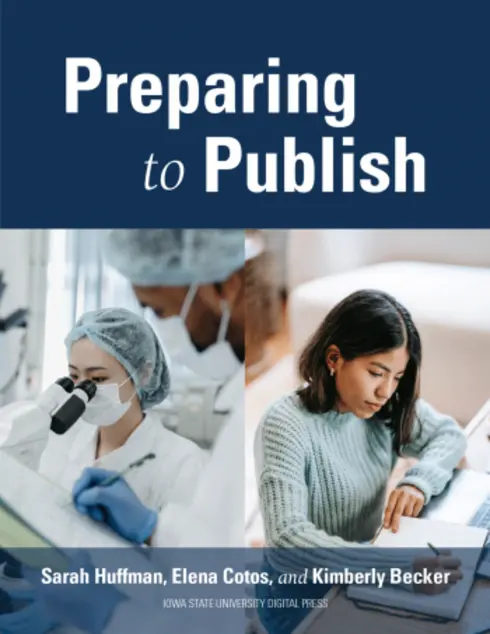
Preparing to Publish
No ratings
Sarah Huffman, Iowa State University
Elena Cotos, Iowa State University
Kimberly Becker, Iowa State University
Copyright Year:
Publisher: Iowa State University
Language: English
Formats Available
Conditions of Use
![]() Attribution-NonCommercial-ShareAlike
Attribution-NonCommercial-ShareAlike
CC BY-NC-SA
Table of Contents
- Introduction
- Chapter 1
- What is a Scientific Argument?
- How to Use this E-book
- Note to Students
- Note to Instructors
- Chapter 2
- Conceptualizing the Research Article
- The Sections of a Research Article
- What is Research?
- What is a Genre?
- Exploring the Anatomy of a Research Article
- Chapter 2 Synopsis: The Organization of a Research Article
- Chapter 3: Writing the Introduction Section
- Conceptualizing the Research Article
- Goals of an Effective Introduction Section
- Introduction Goal 1: Establishing a Knowledge Territory
- Introduction Goal 2: Identifying a Niche
- Introduction Goal 3: Addressing the Niche
- Some Other Important Points about Introductions
- Chapter 3 Synopsis: Writing Introductions
- Chapter 4: Writing the Methods Section
- Conceptualizing the Research Article
- Goals of an Effective Methods Section
- Methods Goal 1: Contextualize the Study's Methods
- Methods Goal 2: Describe the Study
- Methods Goal 3: Analyzing the Data
- Chapter 4 Synopsis: Writing Methods Sections
- Chapter 5: Writing the Results Section
- Conceptualizing the Research Article: Review
- Goals of an Effective Results Section
- Results Goal 1: Approaching the Niche
- Results Goal 2: Occupying the Niche
- Results Goal 3: Construing the Niche
- Results Goal 4: Expanding the Niche
- Chapter 5 Synopsis: Writing Results Sections
- Chapter 6: Discussion/Conclusion Section(s)
- Conceptualizing the Research Article
- Goals of an Effective Discussion/Conclusion Section
- Discussion/Conclusion Goal 1: Re-establishing the Territory
- Discussion/Conclusion Goal 2: Framing Principal Findings
- Discussion/Conclusion Goal 3: Reshaping the Territory
- Discussion/Conclusion Goal 4: Establishing Additional Territory
- Chapter 6 Synopsis: Writing the Discussion/Conclusion
- Chapter 7: Writing Abstracts
- Defining Abstracts
- Goals of an Abstract
- Formal Features of Abstracts: Length, Word Choice, and Grammar
- Chapter 7 Synopsis: Writing the Abstract
- About the Contributors
About the Book
This book offers a wealth of instructional material on the topic of research article writing for publication and thesis or dissertation completion. The text provides graduate student writers with helpful information, strategies, and tips on navigating disciplinary writing in their fields and how to understand, dissect, and ultimately, construct their own research article. The text is organized according to a standard research article format, breaking down each section of the empirical research in a simple and straightforward manner to help graduate students build a quality, argument-driven manuscript as they write up their empirical study findings.
About the Contributors
Authors
Sarah Huffman, PhD, is the Assistant Director of the Graduate College’s Center for Communication Excellence at Iowa State University. Her research interests include genre analysis and academic writing instruction, best practices for training graduate student writing tutors, and systemic functional linguistic approaches to language development. Dr. Huffman teaches graduate-level courses in advanced academic communication and research writing and science communication.
Elena Cotos, PhD, is an Associate Professor in the Applied Linguistics Program and in the interdisciplinary Human Computer Interaction Program at Iowa State University. She is also the Director of the Center for Communication Excellence of the Graduate College. Additionally, she serves as the Book Review Editor for the English for Specific Purposes journal. Her research agenda bridges corpus-based genre analysis, genre-based automated writing evaluation, writing pedagogy, and computer-assisted language learning and assessment – all converging to address language teaching and learning needs.
Kimberly Becker, PhD, is a Communication Consultant for the Center for Communication Excellence at Iowa State University. Her research interests include disciplinary academic writing and corpus linguistics. Dr. Becker leads webinars and workshops related to academic communication development and supports postdoctoral scholars through one-on-one consultations.
